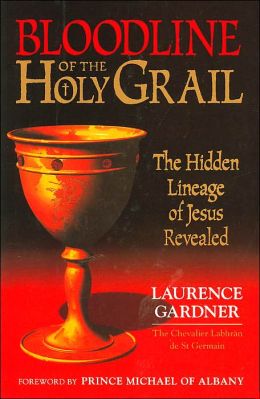I know I’m writing far
more about this book than it actually deserves but I have some more to say
about Gardner’s book Bloodline of the
Holy Grail[i]
Discrimination can be a
good thing. Not when judging people
based on skin color or gender or religious practice – but when writing a book –
especially one that wants to be taken as a serious work of scholarly
literature, one should discriminate reliable from unreliable sources. I am
now 183 pages into the book and, from what I can gather: Gardner has no ability
to discriminate at all. None. He can't do it.
He quotes (selectively,
of course) from respected scholars like Geza Vermes, Raphael Patai, and Elaine
Pagels, but also from dubious and ridiculous people like Michael Baigent,
Margaret Starbird, and Barbara Thiering.
Further, he constructs
his story by quoting (and ‘de-coding’) the canonical gospels, as well as bringing in details from numerous Gnostic and apocryphal gospels, as if they’re all part of
the same whole, completely ignoring the inherent contradictions between them. He includes stories and legends written hundreds of years after the events and takes them as
historically pure without any critical examination.
Now if this were to be taken as fiction I would say this
is wonderful stuff: a sweeping story of action and intrigue and danger, a cast of
thousands in exotic locations. But taken as
a scholarly investigation of history and theology.... not so much.
This lack of
discrimination is not only a problem for authors of pseudo-history, but also
for many members of the Christian church.
I remember several conversations I had with a woman in our congregation several years ago. She liked to study the bible, was always very active in our mid-week bible studies. And she read a lot – but not always books of quality (I was never able to persuade her to leave behind the Left Behind books…) Several times she asked me about this, that or the other in the Bible and then would pause in her question… “or did I read that in a novel?”
She wasn’t able to discriminate between her sources. I tried, while we were there, to help guide her toward better material and to help her to ask better questions of the material she was reading – so that she wouldn’t merely accept everything that was written at face value.
I remember several conversations I had with a woman in our congregation several years ago. She liked to study the bible, was always very active in our mid-week bible studies. And she read a lot – but not always books of quality (I was never able to persuade her to leave behind the Left Behind books…) Several times she asked me about this, that or the other in the Bible and then would pause in her question… “or did I read that in a novel?”
She wasn’t able to discriminate between her sources. I tried, while we were there, to help guide her toward better material and to help her to ask better questions of the material she was reading – so that she wouldn’t merely accept everything that was written at face value.
And it wasn’t just her.
I have several times in the past couple of months suffered the effects of a sudden and violent eye roll when I’ve seen others of my denomination posting material on Facebook from Joel Osteen, or Joyce Meyer or …shudder… Benny Hinn. Are we completely unable to discriminate? Do we have no critical thinking skills at all?
I have several times in the past couple of months suffered the effects of a sudden and violent eye roll when I’ve seen others of my denomination posting material on Facebook from Joel Osteen, or Joyce Meyer or …shudder… Benny Hinn. Are we completely unable to discriminate? Do we have no critical thinking skills at all?
[i]
Gardner, Laurence, Bloodline of the Holy Grail: The Hidden Lineage of Jesus
Revealed, Revised and Expanded Edition, Fair winds Press, Gloucester, MA
2002





No comments:
Post a Comment